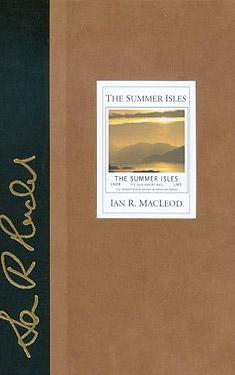Ian R.
MacLeod
Completed 2/2/2019,
Reviewed 2/2/2019
4 stars
This beautifully
written book started life as a novella, winning the World Fantasy Award for that
category. Expanded to novel length, it was
nominated for several awards, including the Gaylactic Spectrum Award. It is an alternate history story where Britain
loses the First World War and descends into fascism. Its prose is stunning, though at times, it
felt a little too British, with some words and references I didn’t get. Nonetheless, it was a joy to read despite its
depressing content.
Geoffrey
Brook (aka Griffin Brooke) is an instructor at Oxford in 1940 who finds out he has
cancer. He’s a closeted gay man, having
lost the love of his life to the war. His only contact is the occasional tryst with
a married man in an abandoned shed. Brook’s life is unremarkable. He has a steady job, and has remained
cautious in his relatively few sexual encounters. One day Brook finds that the man and his
family have been made to disappear. Thinking
it was because of his homosexuality, he fears for his own life. It turns out it’s because the man was married
to a Jewish woman. Relieved but still
concerned, he goes on a quest to find where they’ve been ensconced. On the journey, he recalls his relationship
with a young man named Francis twenty-five years earlier.
What makes
Brook special, though, is that the dictator, John Arthur, claims that Brook was
his tutor as a child. Brook doesn’t
remember him, but goes along with the story anyway. He believes that that’s what got him his
position at Oxford, not being university trained or a proper professor. The rest of the book follows Brook as he
returns from his failed quest to find his tryst partner and suddenly finding
his path crossing with John Arthur’s.
The book
never is never really fast-paced. It’s
slow and methodical doing a wonderful job of exploring Brook’s sexuality subtly
while he remembers his short time with Francis.
At the same time, it explains the rise of fascism, nationalism, and sanctioned
bigotry over roughly the same period in a very multi-dimensional light. It shows how people in a situation do not
recognize what’s going on around them until it hits close to home, like when you
are the target of government condoned prejudice or when people begin to
disappear. The book is never preachy. In fact, it was very subtle, just as the
changes in society were subtle. The book
takes an exciting turn when Brook gets invited to John Arthur’s fiftieth
birthday celebration, which also coincides with the national holiday of Trafalgar
Day. Still the pacing remains the same,
but I definitely read it more quickly.
I felt that
the book is very soft science fiction in that it is an alternate history. These types of stories almost can fall into
the category of literature, especially this book with its wonderful construction
and prose. It reminded me of lonely, closeted
gay man classics, particularly “Death in Venice”. MacLeod, a straight man, really does a good
job of describing the kind of sad life that many men were forced to live in the
early twentieth century.
I give the
book four stars out of five. It creates
a vibrant portrait of a Britain that could have been, or perhaps even what life
for an average person was like in Germany during the early rise of Hitler. It also makes the life of an unremarkable
person seem interesting and noteworthy.

No comments:
Post a Comment